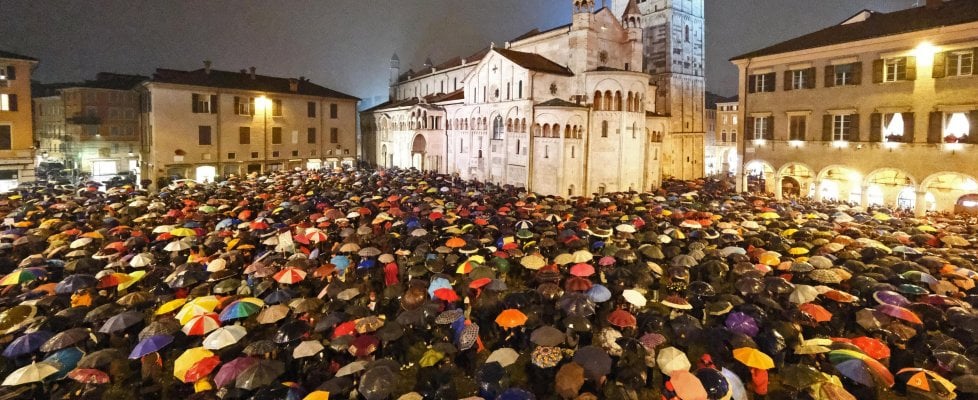
Pam Barker | Director of TLB Europe Reloaded Project
How Soros does it.
 means that the Left in Emilia-Romagna managed to fend off quite a robust challenge by Matteo Salvini’s party Lega while the populist-Left 5 Star party took a hit. The establishment left coalition under Stefano Bonaccini came in at 51.4% while the right coalition scored 43.6% (see chart below). In a traditionally left-wing region, the right did very respectably, but could have done even better had it not been for the major effort by a young group of left-wingers calling themselves the Sardines (see featured image) who, among several other apparently effective strategies, influenced the turnout. As of January 9, Salvini’s Lega was polling only 2% behind the Establishment Left so something had to be done.
means that the Left in Emilia-Romagna managed to fend off quite a robust challenge by Matteo Salvini’s party Lega while the populist-Left 5 Star party took a hit. The establishment left coalition under Stefano Bonaccini came in at 51.4% while the right coalition scored 43.6% (see chart below). In a traditionally left-wing region, the right did very respectably, but could have done even better had it not been for the major effort by a young group of left-wingers calling themselves the Sardines (see featured image) who, among several other apparently effective strategies, influenced the turnout. As of January 9, Salvini’s Lega was polling only 2% behind the Establishment Left so something had to be done.
What’s most interesting about these elections, then, is the extent of the Sardines’ sudden influence. By manipulating the main parties’ fears of Salvini this makeshift movement has not only blocked the right: it has effectively made the ruling coalition dependent on their endorsement. For now, the organisers are playing down the possibility of forming their own party. This seems wise. While being outsiders has its drawbacks, it has enabled them to avoid self-defeating echo chambers and foster a remarkable pluralism that has been key to their success.
In less than two months, Italy’s Sardines movement has gained international visibility. Through the use of Facebook and other social media, it has organized flash mobs and protests throughout Italy, attracting hundreds of thousands of participants. It is now planning a national congress in March.
The initiative began in mid-November, when former deputy prime minister Matteo Salvini, leader of the fascist Lega, organized an event in the city of Bologna to launch the candidacy of Lega’s Lucia Borgonzoni for Emilia-Romagna’s presidency in the regional elections taking place Sunday, January 26. The protest rapidly spread to other Italian and European cities. Last Sunday, a week before the regional elections, another 40,000 joined a Sardines’ rally in Bologna.
 Just out of nowhere, then, they emerge to secure the vote for the establishment left. A little digging shows that none other than George Soros is most likely behind it. In his statement at Davos (Remarks delivered at the World Economic Forum) in January, he gives them an honorable mention (notice the phrase “I learnt about …”):
Just out of nowhere, then, they emerge to secure the vote for the establishment left. A little digging shows that none other than George Soros is most likely behind it. In his statement at Davos (Remarks delivered at the World Economic Forum) in January, he gives them an honorable mention (notice the phrase “I learnt about …”):I began to form this conclusion when I learnt about a spontaneous movement of young people turning up at rallies held by Matteo Salvini, the would-be dictator of Italy. They held up cut-out signs of sardines proclaiming “sardines against Salvini,” and explaining that there are many more sardines than sharks like Salvini, so the sardines are bound to prevail.
Sardines are the Italian variant of a worldwide trend led by young people. This leads me to conclude that today’s youth may have found a way to confront nationalist dictatorships.
 Three young pro-migrant, NGO employees are behind the Sardine movement – Stephen Ogongo, Fabio Cavallo and Emiliano Leone. A major campaigner for the establishment left candidate who won in Emilia-Romagna, Stefano Bonaccini, is none other than Elena Ethel Schlein, who had worked on Obama’s election campaign in 2008. Considered a rising star of the Italian Left, she is listed as one of Soros’ ’14 close Italian friends‘ and appears in his list of ‘Reliable Allies in the European Parliament‘ of which there are no less than 226.
Three young pro-migrant, NGO employees are behind the Sardine movement – Stephen Ogongo, Fabio Cavallo and Emiliano Leone. A major campaigner for the establishment left candidate who won in Emilia-Romagna, Stefano Bonaccini, is none other than Elena Ethel Schlein, who had worked on Obama’s election campaign in 2008. Considered a rising star of the Italian Left, she is listed as one of Soros’ ’14 close Italian friends‘ and appears in his list of ‘Reliable Allies in the European Parliament‘ of which there are no less than 226.
Why hasn’t Consortium News, who published the piece below, picked up on this?
Regional Victory Spotlights Italy’s Sardines Movement
ATTILIO MORO
Attilio Moro says the children of the left-wing Emilian establishment chose their name to suggest that if they stick together tightly, they are safer and able to protect themselves from the larger fish.

Sardines’ flash mob in Modena, Italy, Nov. 19, 2019. (Taleoma, Flickr, CC BY 2.0, Wikimedia Commons)
ATTILIO MORO
in Brussels
Special to Consortium News
 At the end of January, the Partito Democratico (PD), the main political party of the Italian left, which lost votes nationwide in the last three elections, won the regional elections in Emilia, an area in Italy’s north, whose major city is Bologna.
At the end of January, the Partito Democratico (PD), the main political party of the Italian left, which lost votes nationwide in the last three elections, won the regional elections in Emilia, an area in Italy’s north, whose major city is Bologna.
The party defeated Matteo Salvini’s Lega, a right-wing populist party, that was well positioned to grab the region from the left, which had been governing Emilia since 1945 (with both the Communist Party until 1990, and then PDS-PD).
Salvini probably would have won if the Sardines hadn’t emerged on the political scene: This is a new movement launched by the children of the traditional left-wing Emilian establishment. The older generation had lost touch with their constituency, opening the doors to Salvini’s right-wing populism. Sardine’s organizers filled the town squares all over Italy with young people, who, in turn, pushed voters to turn out in big numbers in order to keep the right wing Lega out of power in the most ancient stronghold of the left. Sardines’ message, which has proved so popular, is simple: Let’s return to civilized politics and life, in general. Stop the insults, refrain from slandering opponents, be honest, transparent and listen to the people’s needs. The message adds that in order to launch a new type of Italian politics, people should not replace real participation with social media: It argues that the Internet and Facebook are the realm of manipulation and fake news rather than genuine discussion.
Mass Participation
The organization wants to defend democracy and civil society and adds there must be mass participation because, without it, there will be no political regeneration. Above all, participants must use a new language that is non-aggressive and even playful to convey their political values.
The activists’ preferred way to connect with the public is through what they call a “flash mob,” where they describe their politics in 20 minutes, or the time it takes to draw a cartoon of a sardine, listen to a couple of activist songs, and then leave.
“People like it,” says Mattia Santori, who is from Bologna and the group’s spokesman – “because they participate with their whole bodies, brains and thoughts. In this way, the town squares are filled not with angry outbursts but with people who are willing to listen to something meaningful.”
With this simple message, Sardines was able to organize mass demonstrations in Bologna, Modena, Reggio Emilia, Rome and other Italian cities where in the last few years the populist Lega and Five Star Movement had emerged as the driving political force.
Santori, 32, has degrees in law and economics. He has assessed the environmental impact of investments. He’s also an appealing public figure because he loves sports and spends his weekends training a basketball team of handicapped children.
Santori, along with Giulia Trappoloni, 30, (a physiotherapist), Roberto Morotti, 30 (an engineer) and Andrea Garreffa, 30, (a tour operator), were disturbed by the poor state of Italian politics and decided to start the movement.
They agreed to call it Sardines, using the image of the small fish, which, if they stick together tightly, are safer and able to protect themselves from the larger fish. Many Italians, turned off by the state of current politics, responded enthusiastically.
How long will it last? No one knows. But one thing is certain: The mobilization of so many people who reacted so negatively to the political barbarism and sectarianism, prevented Salvini’s Lega from taking over the stronghold of the Italian left. The question, of course, is what Sardine must do to survive. The movement has suggested a new style, but it didn’t address the people’s problems.
Double-Edged Critique
Until now, the leaders seem more interested in political etiquette than mapping out a new course. Being the offspring of the traditional left, their actions are both a critique of Salvini’s populist messages and of their parents’ mistakes. They haven’t yet elaborated a critique of the Italian and European mainstream left.
While they can easily criticize Salvini, they must also assess the failures of the European left — specifically its uncritical acceptance of neo-liberalism, with its cozy relationship with the banks, its elitism and its detachment from people’s daily problems. Lacking such a critique, they will probably not retain their popularity. The Sardine say that politics is not their ambition: Instead, they only want to remain a social movement. But this means that others will capitalize on their popularity and do the job they should be tackling, empowered by their large number of followers.
The working class has been marginalized in Italy as well as in much of Europe. Its purchasing power (from salaries and pensions) has been drastically reduced. With the mainstream left’s complicity (exemplified by Gerhard Schroeder in Germany and Matteo Renzi in Italy), the labor market has been weakened, badly-paid part-time jobs have replaced the more secure jobs of the past, while the banks and finance capital have been coddled by leftist governments.
People are ready to fight — as the French “Gilet Jaunes” (Yellow Vests) have shown. But will Sardines’ new political etiquette be able to lead the fight and fill the political vacuum created by the debacle of the Italian and European left?
************
Original article
Attilio Moro is a veteran Italian journalist who was a correspondent for the daily Il Giorno from New York and worked earlier in both radio (Italia Radio) and TV. He has travelled extensively, covering the first Iraq war, the first elections in Cambodia and South Africa, and has reported from Pakistan, Lebanon, Jordan and several Latin American countries, including Cuba, Ecuador and Argentina. Presently, he is a correspondent on European affairs based in Brussels.

••••
The Liberty Beacon Project is now expanding at a near exponential rate, and for this we are grateful and excited! But we must also be practical. For 7 years we have not asked for any donations, and have built this project with our own funds as we grew. We are now experiencing ever increasing growing pains due to the large number of websites and projects we represent. So we have just installed donation buttons on our websites and ask that you consider this when you visit them. Nothing is too small. We thank you for all your support and your considerations … (TLB)
••••
Comment Policy: As a privately owned web site, we reserve the right to remove comments that contain spam, advertising, vulgarity, threats of violence, racism, or personal/abusive attacks on other users. This also applies to trolling, the use of more than one alias, or just intentional mischief. Enforcement of this policy is at the discretion of this websites administrators. Repeat offenders may be blocked or permanently banned without prior warning.
••••
Disclaimer: TLB websites contain copyrighted material the use of which has not always been specifically authorized by the copyright owner. We are making such material available to our readers under the provisions of “fair use” in an effort to advance a better understanding of political, health, economic and social issues. The material on this site is distributed without profit to those who have expressed a prior interest in receiving it for research and educational purposes. If you wish to use copyrighted material for purposes other than “fair use” you must request permission from the copyright owner.
••••
Disclaimer: The information and opinions shared are for informational purposes only including, but not limited to, text, graphics, images and other material are not intended as medical advice or instruction. Nothing mentioned is intended to be a substitute for professional medical advice, diagnosis or treatment.




